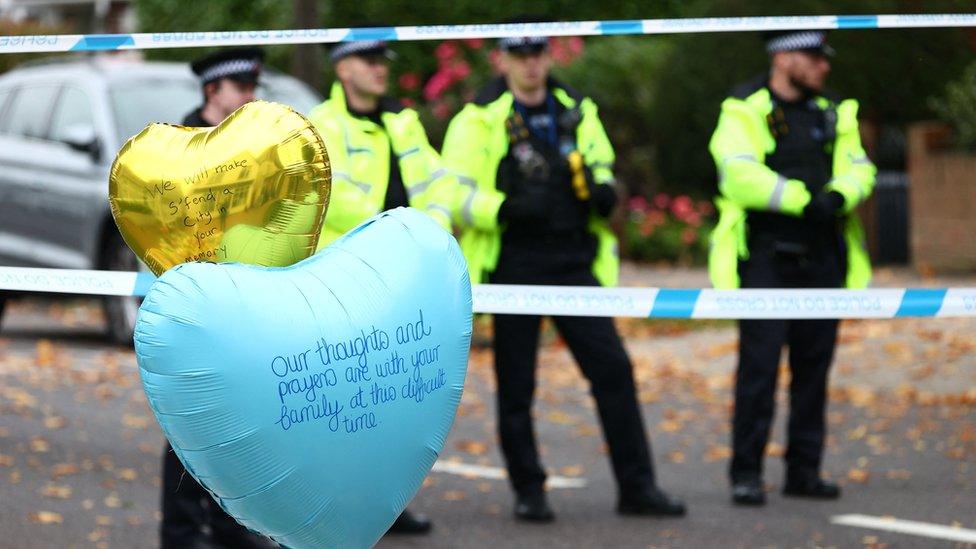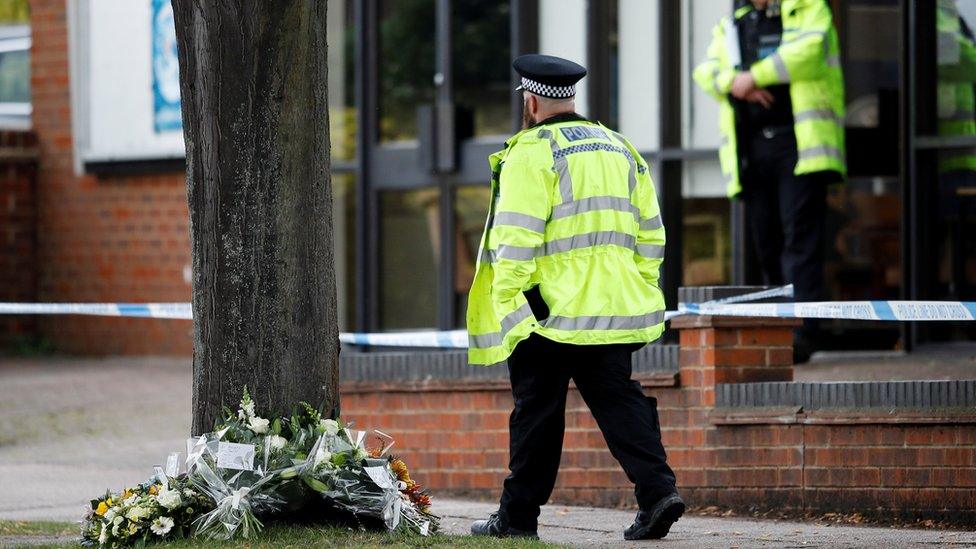Prevent scheme: Why the government's programme is so difficult
- Published

The killing of MP Sir David Amess has put the Prevent programme in the spotlight
The government is facing a difficult dilemma over its controversial counter-extremism programme called Prevent.
News that the suspect held in custody over the killing of MP Sir David Amess had earlier been referred to this scheme has reinforced calls for it to be overhauled and made "more robust".
What is the point, some argue, in referring people to this £40m a year programme - which aims to stop people becoming terrorists or supporting them - if they may then go on to commit murder?
But others argue that hardening it up with more involvement of police and MI5 officers will simply scare away the very people who currently agree to take part in its voluntary de-radicalisation course, the Channel scheme.
Hugo MacPherson, who has worked in the prevention of terrorism in the UK and Europe for 13 years, says: "It is really important that it remains independent from law enforcement, that it operates in the pre-criminal space."
Prevent has always been the most difficult and controversial strand of the government's multi-faceted counter-terrorism strategy, originally set up by Tony Blair's government under the title Contest.
It aims to tackle the problem "upstream" by confronting the violent ideology that drives people towards terrorism, steering them away from it before they commit a crime.
The other strands are simple by comparison. Pursue is the sharp-end: going after known terrorists. Protect is hardening potential targets against an attack and Prepare is the contingency planning for when and if an attack gets through.
Prevent has long been criticised by certain Muslim community activists who say it unfairly demonises and profiles Muslims.
And it is not just Muslim figures who resent it. The programme relies on a wide range of people in society - teachers, council workers, NHS employees - to perform their "civic duty" by reporting an individual's suspected radical opinions or behaviour to Prevent officers in the local police force.
This leads to accusations of snooping and a surveillance society. A committee decides whether or not to refer that person to the programme and, in the more serious cases, to the Channel mentoring scheme.
Attendance is not compulsory and the individual's name and details are not normally passed to MI5, the Security Service, unless there is a concern that at the end of the course the intervention has failed to steer them away from extremism.
In the case of the suspect held in connection with Sir David's death on Friday, Whitehall officials say his name was not on any of their watchlists.
Was this an oversight? Not under the current system, no. So should this now change, as some counter-extremism think tanks are demanding?
It is unlikely this would be welcomed by an overstretched MI5 that is already coping with over 600 active investigations. The last thing MI5 would need is adding hundreds more names to its 3,000-plus list of active "subjects of interest", taking up considerable resources, when most, if not all, of those names may turn out to be harmless.
The other major criticism currently being levelled at Prevent is that it has been too "soft" on potential Islamist radicals.
Dr Rakib Ehsan, a British Muslim academic with the Henry Jackson Society think tank, says: "The mismatch in resources between extremist ideologies poses an all too real prospect of Islamist extremists who present a significant security risk not being sufficiently monitored by public authorities."
Yet Prevent, say its supporters, has had an unfairly bad press.
Under the scheme, says the Home Office, Prevent has supported 2,352 individuals identified as vulnerable to radicalisation between 2015 and 2020. About 100 children safeguarded by the courts were stopped from being taken to conflict zones in Iraq and Syria since 2015.
"One of our successes that people forget is when a group of would-be jihadists in Birmingham went through the programme, changed their minds, and deliberately burned their plane tickets to the conflict zone," says Hugo MacPherson.
Related topics
- Published17 October 2021
